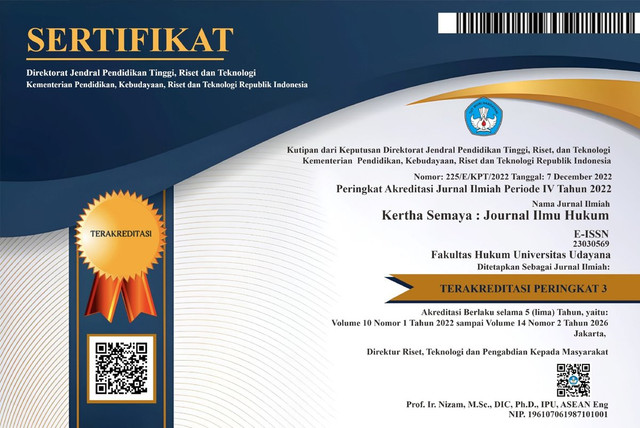PERBANDINGAN HUBUNGAN KERJA ANTARA OUTSOURCING, BORONGAN, PERJANJIAN KERJA DAN MITRA MENURUT UNDANG-UNDANG CIPTA KERJA
DOI:
https://doi.org/10.24843/KS.2025.v13.i10.p18Keywords:
Outsourcing, Borongan, Hubungan Kerja, MitraAbstract
Seiring dengan meningkatnya persaingan antar perusahaan di Indonesia, banyak perusahaan melakukan penyesuaian kepada hubungan kerja. Penyesuaian dilakukan dengan menyelaraskan peran kerja terhadap kompetensi inti perusahaan agar tercipta sistem kerja yang lebih efektif dan efisien. Tujuan riset ini untuk mengkaji berbagai bentuk hubungan kerja di Indonesia sesuai ketentuan UU No. 13 Tahun 2003 dan UU No. 6 Tahun 2023. Hubungan kerja dikaji berdasarkan jenis-jenis dan kategori pekerjaan yang dapat menggunakan sistem outsourcing, borongan, perjanjian kerja (PKWT/PKWTT) serta kemitraan, khususnya dalam konteks industri Rumah Sakit. Riset ini mempergunakan pendekatan normatif-empiris, kemudian data yang disajikan dengan pengelolaan data melalui teknik analisis deskriptif kualitatif. Hasil penelitian menujukan bahwa perbedaan mendasar dalam hubungan kerja ditentukan oleh tiga unsur utama, yaitu perintah, upah. dan waktu kerja. Dari riset ini ditemukan perbedaan mendasar hubungan kerja ditentukan oleh unsur perintah, upah dan waktu kerja. Dalam konteks Undang-undang Cipta Kerja, hubungan kerja PKWT/PKWTT dan outsourcing (tidak termasuk borongan) tunduk kepada perlindungan ketenagaan. Saran untuk Industri kesehatan adalah menjamin kepastian status pekerja, pemanfaatan outsourcing dengan tepat dan memperkuat sistem pengawasan internal serta menjamin kewajiban dan hak pekerja dan tanggung jawab yang diberikan. Hasil penelitian menunjukkan bahwa secara normatif, outsourcing dan PKWT/PKWTT merupakan hubungan kerja yang wajib memenuhi perlindungan ketenagakerjaan, sementara borongan dan kemitraan merupakan hubungan perdata tanpa unsur subordinasi. Setiap jenis hubungan kerja pastinya memiliki resiko perihal ini yang perlu di perhatikan bagi semua pihak.
As competition among companies in Indonesia intensifies, many companies are making adjustments to their employment relationships. These adjustments are based on aligning the roles of workers with the core competencies of the company in order to achieve more effective and efficient work system. The purpose of this study is to examine the various forms of employment relationship in Indonesia as regulated by UU No. 13 Tahun 2003 and UU No. 6 Tahun 2023. Employment relationships are examined based on the types of work that can use outsourcing, contract work, work agreements (PKWT/PKWTT) and partnerships, particularly in the hospital industry. This study uses normative-empirical approach, and the data is processed using qualitative descriptive analysis techniques. The results of the study found that the fundamental differences in employment relationships are determined by the elements of command, wages, and working hours. In the context of the Job Creation Law, PKWT/PKWTT employment relationships and outsourcing (excluding contract work) are subject to labor protection. Recommendations for the healthcare industry include ensuring worker status certainty, appropriate use of outsourcing, strengthening internal oversight systems, and guaranteeing worker’s rights. The results of the study indicate that, normatively, outsourcing and PKWT/PKWTT are employment relationships that must comply with labor protection regulations, while contract work and partnerships are civil relationships without elements of subordination. Each type of employment relationship carries inherent risks that must be carefully considered by all parties involved.
Downloads
Published
How to Cite
Issue
Section
License
Copyright (c) 2025 Bherta Christine Khornaylius, Gunardi Lie

This work is licensed under a Creative Commons Attribution-NonCommercial-ShareAlike 4.0 International License.



